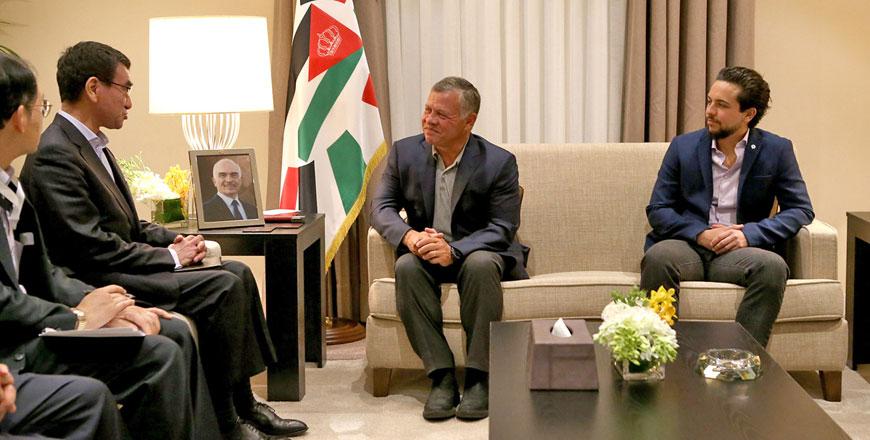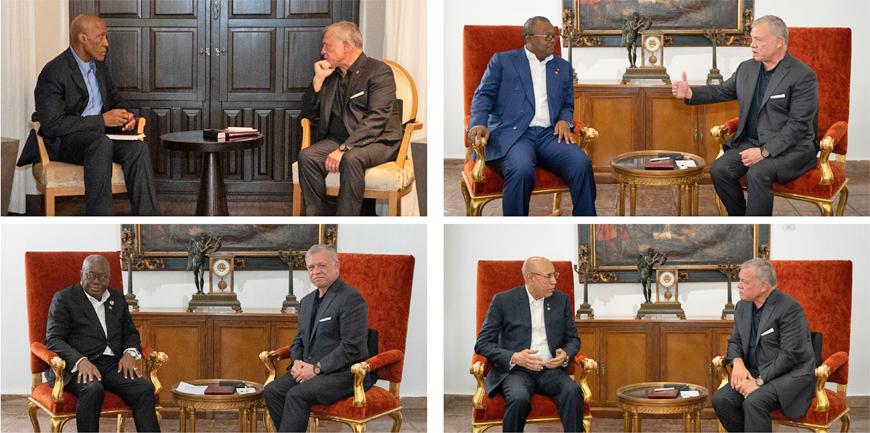You are here
King meets Romanian defence minister on sidelines of Aqaba meetings
By JT - Apr 29,2018 - Last updated at Apr 29,2018

His Majesty King Abdullah, accompanied by HRH Crown Prince Hussein, meets with Minister of National Defence of Romania Mihai-Viorel Fifor in Aqaba on Sunday (Photo courtesy of Royal Court)
AMMAN — His Majesty King Abdullah, accompanied by HRH Crown Prince Hussein, met on Sunday in Aqaba with Minister of National Defence of Romania Mihai-Viorel Fifor over bilateral ties and issues of mutual concern.
The discussions — held on the sidelines of the Aqaba meetings hosted by Jordan for a new round to enhance global coordination on countering terrorism — covered means to enhance military and defence cooperation between the two countries, a Royal Court statement said.
The meetings were due to be concluded on Sunday.
The two sides also discussed developments in the region, as well as regional and international efforts to fight terrorism within a holistic approach.
Chairman of the Joint Chiefs of Staff Lt. Gen. Mahmoud Freihat and Adviser to His Majesty and Director of the Office of His Majesty Manar Dabbas attended the meeting.
This latest round of Aqaba meetings, co-chaired by Jordan and Japan, focussed on means to counter the global threat of terrorism, address security challenges in Southeast Asia and build on the outcomes of previous meetings.
The meetings are part of a series of international meetings launched by King Abdullah in 2015 to bolster security and military cooperation, coordination and exchange of expertise among regional and international partners to counter terrorism and its threat to global peace and security within a holistic approach that addresses the military, security and ideological aspects of the issue, which the King has repeatedly stressed, is not confined to this part of the world.
Senior security and political officials from Southeast Asian countries, international partners, and representatives of the United Nations, the European Union and NATO participated in the two-day round this week.
Organised in rounds with a regional focus, the meetings fostered and encouraged expert discussions on security challenges, especially in regards to regions suffering from terrorism hotspots.
Over the past years, the Aqaba meetings featured similar region-focused discussions with heads and representatives of a number of states in East and West Africa, Southeast Asia and the Balkans, as well as senior officials from around the world.
Related Articles
AMMAN— Jordan on Saturday and Sunday hosts a new round of Aqaba Meetings to enhance global coordination and efforts in countering terrorism
AMMAN — His Majesty King Abdullah, accompanied by HRH Crown Prince Hussein, held separate meetings on Saturday with Japanese Foreign Ministe
AMMAN — His Majesty King Abdullah and King Felipe VI of Spain on Tuesday co-chaired a new round of Aqaba Process meetings in Córdoba, organi


















